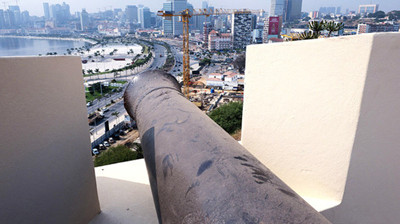安哥拉
Still much too oily
依然很油膩
Angola badly needs to diversify its one-dimensional economy
安國急需多樣化經濟以取代單一經濟體系
FROM the top of the Fortaleza de Sao Miguel, a 16th-century Portuguese citadel that once dominated the Angolan capital, you see an army of cranes erecting high-rise offices, fancy hotels and blocks of smart flats. Luanda's traffic zooms below on an eight-lane highway, as pedestrians amble among palm trees or play basketball on the Marginal, a renovated, spotless promenade. “You almost forget you are in sub-Saharan Africa,” says a foreign businessman well acquainted with the region.
在Fortaleza de Sao Miguel這座曾統治安哥拉首都的城堡上面,你可以看到一隊起重機大軍正在建造高大的辦公廳、奢華的酒店和一幢幢精致的公寓。首都羅安達的交通在一條八車道的高速公路上尤為繁忙,行人們在Marginal這條新修筑的幾乎完美地大街上的棕櫚樹下信步、打籃球。“差點忘了自己是在撒哈拉以南的非洲。”一位對該地區十分熟悉的外國商人如是說。

Such a view would have been unimaginable only 12 years ago when Angola's devastating 27-year civil war had just ended, leaving it a basket case. The economy and infrastructure were in tatters. Health and education systems barely existed.
如此的景象在十二年前是無法想象的,那時安哥拉剛剛結束持續了27年的毀滅性內戰,留下了一堆爛攤子。國民經濟和基礎設施破壞殆盡。醫療系統教育系統幾乎等于沒有。
Since then the former Portuguese colony has grown rapidly thanks to oil. Crude production increased from 800,000 barrels a day (b/d) in 2003 to almost 2m b/d in 2008. The economy expanded by more than 10% a year, making it seem one of the most buoyant in the world. Today Angola's GDP is the fifth-biggest in Africa.
從那時開始,這個曾經為葡萄牙殖民地的國家在石油的幫助下迅速發展。原油產量從2003年的每天八十萬桶增至2008年的約每天兩百萬桶。每年的經濟增幅超過百分之十,這使安哥拉成為全世界經濟增長最快的國家。如今安哥拉的GDP排名全非第五。
The pace of economic activity is frenetic. In downtown Luanda developers plan to put up still more skyscrapers and in July the first grand shopping mall is set to open its doors and tempt shoppers with Armani, Hugo Boss and Prada. In the rest of the country, the government is spending billions of dollars on roads, railways, airports and energy projects.
安哥拉的經濟活力強大到狂熱。在盧安達市區開發商們計劃將更多地摩天大樓計劃提上議案,而在七月份全市第一個超級市場即將開業,里面的阿瑪尼、雨果博斯和普拉達等奢侈品品牌吸引著消費者們。在這個國家的其他地方,政府斥資數十億美元修建公路、鐵路、機場及能源設施。
Yet the days of sky-high growth are coming to an end. During and after a downturn in 2009 and 2010, caused by a crash in oil prices, Angolan policymakers were confident that the economy would quickly regain its swagger. But with oil output more or less stagnant since 2009, when it dropped to 1.8m b/d, the government has been forced to lower its expectations. Jose Eduardo dos Santos, the president since 1979, said in October that growth in 2013 would be 5.1%, well below the target of 7.1%. In fact it will end up at 4.1%, reckons the IMF.
不過,經濟高增長的好日子即將到頭。由于受到了2009、2010年油價大跌的影響,安哥拉進入了經濟低迷期,而這個國家的決策者們自信本國的經濟將很快重回正軌。然而2009年原油產量輸出并不景氣,所以當產量跌至每天一百八十萬桶時,政府不得不降低它的預期。Jose Eduardo dos Santos這位自1979年連任至今的國家總統,在十月聲明說2013年的增幅為百分之五點一,明顯低于目標的百分之七點一。實際上據國際貨幣基金組織測算增幅僅僅為百分之四點一。
Nor is it expected to speed up again in the next few years. Most foreign analysts reckon that predictions by Sonangol, the state oil company, that production will return to 2m b/d next year are unrealistic. Many think 5% GDP growth will be Angola's lot for the time being.
安哥拉的經濟也并不被期待能在近幾年內再次崛起。國有石油公司Sonangol公司預測明年原油產量將恢復每天兩百萬桶,而此舉被大多數國外分析家認為是不現實的。他們中許多人認為百分之五的GDP增幅將成為安哥拉現今的救命稻草。
This could herald big changes for the country. Crucially, it will press the ruling Popular Movement for the Liberation of Angola (known by its Portuguese acronym, MPLA) to do more to diversify the economy. Oil accounts for 97% of exports and almost 80% of state revenues. Last year the government posted its first budget deficit since 2009.
這也許預示了這個國家即將發生改變。最重要的是,這將迫使執政黨——安哥拉人民解放運動(即為人所熟知的MPLA,葡文首字母縮寫)采取更多手段來使經濟多樣化。石油產業產生了百分之九十七的出口貿易額和約百分之八十的國家稅收收入。去年是政府自2009年首次公開預算赤字。
All the same, parts of the non-oil sector are thriving. The banking, telecoms, construction, drinks and retail industries are doing well, fuelled by the rise of a new (though still small) middle class. Manufacturing is picking up, from a very low base. The effects are beginning to be felt on the ground. Luanda, which ranks alongside Tokyo and London as one of the world's most expensive cities for expatriates, is becoming slightly cheaper. “I bought sliced mangoes in a supermarket for the equivalent of $1.50 the other day,” says a foreign banker. “Not long ago, they would have cost me $5.”
同樣的,部分非石油行業也十分繁榮。銀行業,電信業,建筑業,釀酒業和零售業均發展勢頭良好,因為這個國家新興的中產階級正在崛起(雖然數量不多)。制造業正在從非常低的基礎開始發展。它們所產生的影響正在擴大。盧安達這座可以與世界上移民花費最貴的東京和倫敦比肩的城市正在變得越來越廉價。“有一天我在超市里買了價值1.5美元的芒果片,”一個外籍銀行柜員說。“不久前,這些芒果片的價格是5美元。”
Greasy palms
油棕櫚
Yet Angola remains a difficult place for investors and entrepreneurs. In the World Bank's latest “ease of doing business” survey, the country ranks 179th out of 189. Enforcing a contract through Angola's inefficient and sometimes corrupt courts can take years. Getting a visa is a hassle. A dire shortage of electricity means local firms struggle to compete with imported goods.
不過安哥拉依然是個對于投資者和企業家來說十分艱難的地方。在世界銀行最近發起的“經商容易度”調查中,安哥拉從第189位上升至第179位。在安哥拉全國強制執行一項合同相率十分低下,而一件腐敗案的審理有時能耗費數年。申請一紙簽證困難重重。一次可怕的電力短缺意味著當地公司正在努力與進口商品進行競爭。
Moreover, a rentier culture forces many businesses to “partner” with members of the political and military elite. That the president's daughter, Isabel dos Santos, is Africa's first female billionaire is seen by human-rights groups as an indictment of the system.
此外,特有的食利者文化迫使許多商務活動者與許多政治、軍方精英達成所謂的“合作關系”。比如總統的女兒Isabel dos Santos是非洲第一位女性百萬富翁,而人權組織因此對該國體制發起控訴。
Oil provides few jobs for locals and Angola is horribly unequal. The quality of life of people in rural areas and slums, such as Luanda's Chicala, has barely improved since 2002. Most Angolans lack running water or electricity.
石油產業幾乎并沒有為當地居民提供任何工作機會并且安哥拉內部存在著嚴重的不平等。人民的生活水平自2002以來鮮有提升,尤其是像Luanda's Chicala這樣的郊區和貧民窟。大多數安哥拉人缺乏新鮮水源和電力。
Many within the MPLA privately admit to its failure to develop the non-oil economy. Since 2012 the government has talked more about improving social conditions, health care and education.
安哥拉人民解放運動內部許多官員承認他們發展非石油產業經濟的舉措失敗了。自2012年,政府討論的更多是改善社會環境、醫療水平和教育水平。
Yet there is little sign of large-scale political or social unrest. Protests in Luanda, including one in November when the police detained 300 people and shot dead an opposition activist, are sporadic. The MPLA controls almost all of the media, while the two main opposition parties lack mass appeal. A smooth transition is generally expected when or if the 71-year-old president steps down as he has hinted, probably between now and 2017, when the next national elections are to be held.
不過仍有微弱跡象表明安哥拉存在著大規模的政治波動和社會動蕩問題。在盧安達的示威抗議不時發生,例如在十一月那次抗議活動警察拘押了300多人并射殺了一名激進分子。安哥拉人民解放運動幾乎控制了所有媒體,這使另外兩個主要反對黨缺少廣泛的吸引力。在71歲高齡的總統如他所暗示的那樣辭職之后,和平過渡被大眾所期待,雖然那不知道何時甚至不知道是否會發生,有可能是在2017年的下次全國大選舉行之前。
There was talk of his son, Jose Filomeno de Sousa dos Santos, who is chairman of Angola's sovereign-wealth fund, being lined up as a successor. But it has died down. Instead, the president is thought to favour his business-minded vice-president, Manuel Vicente, who ran Sonangol from 1999-2012. He cannot be guaranteed to tilt the country away from oil.
有傳言說總統的任職安哥拉主權財富基金會主席的兒子Jose Filomeno de Sousa dos Santos被列為勝選者。但這種傳言已經消失。相反地,總統被認為非常中意他非常有商業頭腦的副總統Manuel Vicente,此人在1999年至2012年掌管Sonangol公司。他不可能保證讓這個國家不向石油傾斜。
But a new generation of Angolans is coming of age; about 60% of the country's 21m people are under 25. Unlike their parents, they will not be satisfied solely with the MPLA's achievement in making peace earlier this century. What they need is jobs. And oil alone will not provide them.
新一代的安哥拉人達到了法定年齡,大約占這個國家人口百分之六十的兩千一百萬人低于25歲。他們將不會像他們的父母那樣僅僅滿足于安哥拉人民解放運動在新世紀開始時在和平方面的成就。他們需要工作,而光是石油是沒法滿足這種需求的。譯者:許寶明












